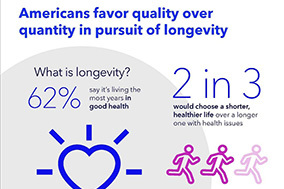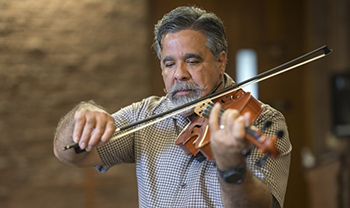Turning to technology to restore quality of life
A new survey found most Americans believe healthcare tech can help them live longer and healthier, but only 18% are taking advantage of it

For nearly two decades, doctors could not pinpoint why 41-year-old Mekaela Davis experienced mysterious symptoms like heart palpitations, migraines, and light-headedness. Today, the active mom credits two healthcare technologies with helping to identify her medical problem and restoring her quality of life.
Davis is one of many Americans who are advocating for their own health and prioritizing quality of life. However, a new survey from Medtronic and Morning Consult suggests that tech may be an untapped option for many others. According to the survey, while 80% of Americans believe healthcare tech can help them live longer and healthier, only 18% are taking advantage of it.[i]
Meanwhile, advances in technology are, for example, helping catch cancer before it progresses, treating pain with less oral medication, and reducing the burden from chronic diseases.
For Davis, healthcare technology has been life changing. After years of unknown symptoms, her doctors placed the Reveal LINQ™ insertable cardiac monitor (ICM) − a device just one-third the size of a AAA battery − under her skin that eventually led to the diagnosis of a heart rhythm abnormality. To treat the issue, doctors then recommended another device: a pacemaker. A pacemaker helps restore the heart's rhythm by sending tiny electrical signals to the heart to increase the heart rate. As a busy parent with a demanding job, Davis advocated for a leadless pacemaker to fit her active lifestyle. Davis received the world’s smallest pacemaker, MicraTM AV. The size of a large vitamin, Micra AV is placed entirely inside the heart, without the need for leads (wires) or a device pocket under the skin.
Talking to your doctors about treatment options that prioritize your needs – the way Davis did – is one important way to take charge of your health and live your best life.
It’s also important to discuss new screening technologies that may detect health issues early and to consider all your treatment options. Arm yourself with information - don’t delay treatment because of assumptions you have made about procedures or recovery times.
Today, Davis has peace of mind and wants her story to inspire others — especially those who may have health issues dismissed or misdiagnosed because they’re young and fit.
“I feel like it’s important to share my story because while it may not be the traditional story of how one ends up with heart devices and a care plan, if this can prevent even one person from going down a long and winding journey, then it’s absolutely worth it,” she said.
This story recounts one patient’s experience and may not be representative of all patient outcomes. These devices are not for everyone, and results may vary.
Always talk to your doctor about risks, diagnosis, and treatment information.
For important safety information about the LINQ family of ICMs, visit: https://www.medtronic.com/us-en/patients/treatments-therapies/insertable-heart-monitors/getting-monitor/important-safety-information.html
For important safety information about Micra, visit: https://www.medtronic.com/us-en/patients/treatments-therapies/pacemakers/our/micra/important-safety-information.html
L00104212024
Related content
[i] Source: This survey was conducted by Medtronic and Morning Consult between February 15-20, 2024, among a nationally representative sample of 2,200 general population adults. Results from the full survey have a margin of error of +/- 2 percentage points.



